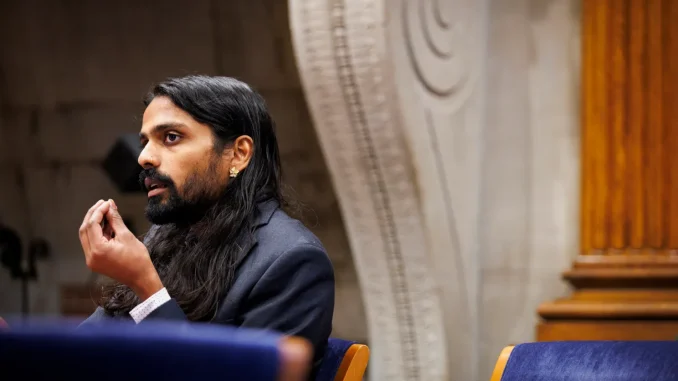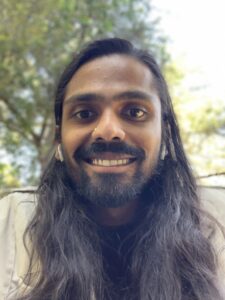
 We’re excited to finish up our F24 semester with an interview from our alum Dr. Leslie J. Fernandez, who did their BA in English with us in 2016. As a bonus, after the interview we’ll include two recent publications by Dr. Fernandez, the first of which (on Philip K. Dick) can trace its origins to a paper in Dr. Elda Tsou’s undergrad class.
We’re excited to finish up our F24 semester with an interview from our alum Dr. Leslie J. Fernandez, who did their BA in English with us in 2016. As a bonus, after the interview we’ll include two recent publications by Dr. Fernandez, the first of which (on Philip K. Dick) can trace its origins to a paper in Dr. Elda Tsou’s undergrad class.
Here’s our interview with Dr. Fernandez:
When did you graduate from St. John’s? What degree(s) do you have from us?
I graduated from St John’s in 2016 with a B.A. in English.
What thing that you learned at SJU English do you think has been most helpful to you in your post-SJU career?
A remarkable amount of what I learned at SJU English as an undergraduate has continued to serve me in graduate school and into my time as a professor. I’m particularly indebted to Dr. Elda Tsou who introduced me to Edward Said, whose work has been fundamental in shaping my research, and for also being kind enough to work with me post-graduation to do a crash course on Asian American literature/studies. I continue to teach much of what I learned from her in my courses. Dr. Dohra Ahmad & Dr. Raj Chetty similarly introduced me to a number of postcolonial thinkers that I continue to regularly teach and cite.
I also learned to think about literary and cultural analysis in tandem with my own creative production. I fondly remember turning in poetry & music for Dr. Steve Mentz’s Intro to English course as well as a DJ mix for Dr. Shanté Smalls’ course on Hip Hop Aesthetics. I also greatly enjoyed the creative writing courses I was able to take, particularly with Dr. Gabriel Brownstein. In the courses I teach now, I regularly offer my student’s a creative option as part of their final project, and this was very much shaped by my own course experiences as an undergraduate.
What did your path look like from graduation to your current job?
After graduating, I took a year off to prepare my applications to graduate school and worked as a writing consultant at Queensborough Community College during that time. I then spent 6 years completed my Ph.D. in English at the University of California, Riverside, where I worked on my dissertation on Science Fiction and Techno-Orientalism. Post graduation, I was hired as a Lecturer of Asian American Studies at Harvard in the Committee of Ethnicity, Migration, Rights (EMR), and after a year in that position, I was fortunate enough to be promoted to my current position as Program Director of EMR.
What does a typical day or week look like in your position?
My typical day/week can vary so widely in this position! As Program Director, I have to wear many different hats and swap between them regularly. One of my primary responsibilities is student advising, so I regularly meet with prospective or current students pursuing a minor with our program and advise them on course requirements. Relatedly, I do a lot of curriculum planning in the early parts of the semester, making the initial determinations of what courses should count for our minor from across the universities’ course catalog, as well as advising lecturers in the program about their own courses and what gaps we might need to fill. EMR is a very student-centered program, and we do a lot of event planning, either through our student run working groups in AAPI, Latinx and Muslim American studies, or through co-sponsoring student organizations, and I’m usually helping with logistics or planning events with my staff colleagues in any given week. I also coordinate a bi-weekly Dissertation Writing Group for graduate students in the field. Representing the program and networking is also a regular part of the job, so aside from students, I often meet with deans, as well as faculty and staff from other departments and programs, or schools, and occasionally, alumni. While I teach less in this position than I did as a Lecturer, I still teach a course in the Fall and thus meet once a week for a 2h30min seminar and do course prep as well as grading for the course. Whenever I can find some spare time to squeeze in, I do also try to keep up with my own research and writing.
What is your favorite part of being in your current position?
It would definitely be the opportunities to engage with students. Student mentoring has always been one of my favorite parts of being a professor, and this position allows me to interact with and offer advice to a lot of students in a variety of different contexts. So much of my own life has been shaped by the time and kindness my own professors have given to me and I am glad to be in a position where I can pay that forward.
What are the most valuable skills you learned as an English major? How have they helped you post-graduation?
I think the most valuable skills I’ve learnt is how to consider and critically think about a text in all its wide permutations. The courses I’ve taken in English have trained me to think about the implicit meanings in the written word, and to make connections across contexts which has shaped how I think about and navigate so much of the world. Much of my political consciousness was developed and shaped by my experiences and readings in English courses and have had a profound impact on how I approach my own social and political life.
What is your advice to other English majors?
Read widely, read voraciously, and make full use of the opportunity you have! Even just a few years out of school, I already deeply miss being able to take classes, and the luxury of really sitting with a text and discussing it with your peers and professor.
Here are two of Dr. Fernandez’s recent published articles:
Fernandez, Leslie J. “Do Androids Dream of Racialization?: Techno-Orientalism and the Android Imaginary in the Work of Philip K. Dick.” Extrapolation, 7 July 2023, doi: https://doi.org/10.3828/extr.2023.12
Fernandez, Leslie J. “Extrospection: Zen and the Art of Being Posthuman in Ruth Ozeki’s A Tale for the Time Being.” Textual Practice, 1 September 2021, doi: https://doi.org/10.1080/0950236X.2021.1971
I’ve had a chance to read the “Extrospection” article on Ruth Ozeki’s A Tale for the Time Being, and it’s fantastic! Anyone interested in how we might respond to the environmental, social, and political chaos of twenty-first century life should read this article!

Leave a Reply